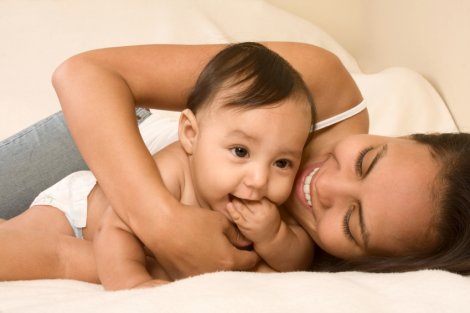Postpartum Hair Loss Is Normal

Although postpartum hair loss is normal to many new moms it is shocking news. During pregnancy women enjoy having thick beautiful hair, but after the baby is born they are surprised to see more hair falling out than usually.
Since hormonal balance during pregnancy causes thick hair many moms start thinking that breastfeeding is the reason for alopecia. However, nursing a baby is not related to hair loss, even though the baby takes a lot of nutrients, vitamins and minerals from mom in her milk, it does not have any effect on her hair.
In order to see clear picture of hair loss during postpartum period and understand how to go away from it one should know how the hair grows. At all the times around 90% of all hair is in growing or Anagen phase which lasts for two years. After this the hair prepares to fall out by going into resting or Telogen phase. In two or three months this phase is over and 10% of hair falls out giving room to new strands to grow.
The rise of various hormones like estrogen elongates Telogen phase, preventing normal hair loss, so women notice less hair strands on the brush after combing and feel good about having thicker hair. However, after the baby is born, hormones slowly balance out to their previous amount and all resting hair needs to fall out. It feels like the woman loses too much, but in fact the hair just catches up with whatever did not fall out within previous nine months.
Excessive hair loss after pregnancy is called Telogen effluvium. About 40 to 50 percent women experience it after having a baby, but as most changes altered by pregnancy the hair loss is temporary and normal hair cycle will be restored in three to six months. Besides, the good news is that this kind of alopecia does not lead to complete baldness. The studies show that up to 60% of growing hair might move to resting phase and stay there while the level of estrogen is high. After the hormones level out, hair loss takes place, but at the same time the old hair is replaced by new growth almost immediately.
Although many new moms experience postpartum alopecia it is not a reason for everybody to worry. The hormonal levels are different for people and their influence on the body processes varies, so there are women that do not have this problem. The hair loss is more obvious for those who have longer hair which is also the reason why some women do not notice it at all.
It is impossible to stop hair from falling out, but there are some tricks which might be helpful. First of all hair stylists advise to cut hair short to so called “wash-and-go” style. This way the long hair strands will not be seen everywhere in the house and the hair brush will not have to hold as much. Short hair is also more comfortable when new mom’s hands are so busy taking care of the baby that there is no time for much hair care. A big problem of long hair is that babies like to pull it as soon as they have a chance to do so and short hair eliminates this trouble.
If the woman is not satisfied with the thickness of hair during the period of hair loss, many hair products will be useful. Mousses and crèmes that add volume are good helpers in this matter.
In order to provide healthy “food” for hair and stimulate its growth it is recommended to eat a lot of vegetables, herbs, berries and fruits rich in flavonoids and antioxidants. Blueberries, blackberries, strawberries, plums, cherries, apples, garlic, parsley, broccoli and tomatoes are the good sources of them. Drinking green tea and red wine, eating almonds and chocolate and using extra virgin olive oil in dishes is beneficial for the same reason.
Hair is extremely responsive for vitamins A, B complex, C and E, so if the fruit and vegetable intake is not enough, a new mom should use the vitamins in her everyday diet.
Lynn Street
Posted on June 9, 2009
Filed Under Hair Loss, Hair Loss Conditions, Hair Loss Reasons
Comments
Leave a Reply